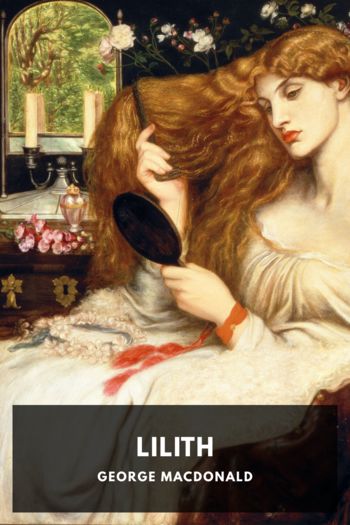Lilith - George MacDonald (read my book .txt) 📗

- Author: George MacDonald
Book online «Lilith - George MacDonald (read my book .txt) 📗». Author George MacDonald
I hurried down the hill: my pilgrimage was begun! In what direction to turn my steps I knew not, but I must go and go till I found my living dead! A torrent ran swift and wide at the foot of the range: I rushed in, it laid no hold upon me; I waded through it. The next I sprang across; the third I swam; the next I waded again.
I stopped to gaze on the wondrous loveliness of the ceaseless flash and flow, and to hearken to the multitudinous broken music. Every now and then some incipient air would seem about to draw itself clear of the dulcet confusion, only to merge again in the consorted roar. At moments the world of waters would invade as if to overwhelm me—not with the force of its seaward rush, or the shouting of its liberated throng, but with the greatness of the silence wandering into sound.
As I stood lost in delight, a hand was laid on my shoulder. I turned, and saw a man in the prime of strength, beautiful as if fresh from the heart of the glad creator, young like him who cannot grow old. I looked: it was Adam. He stood large and grand, clothed in a white robe, with the moon in his hair.
“Father,” I cried, “where is she? Where are the dead? Is the great resurrection come and gone? The terror of my loneliness was upon me; I could not sleep without my dead; I ran from the desolate chamber.—Whither shall I go to find them?”
“You mistake, my son,” he answered, in a voice whose very breath was consolation. “You are still in the chamber of death, still upon your couch, asleep and dreaming, with the dead around you.”
“Alas! when I but dream how am I to know it? The dream best dreamed is the likest to the waking truth!”
“When you are quite dead, you will dream no false dream. The soul that is true can generate nothing that is not true, neither can the false enter it.”
“But, sir,” I faltered, “how am I to distinguish betwixt the true and the false where both alike seem real?”
“Do you not understand?” he returned, with a smile that might have slain all the sorrows of all his children. “You cannot perfectly distinguish between the true and the false while you are not yet quite dead; neither indeed will you when you are quite dead—that is, quite alive, for then the false will never present itself. At this moment, believe me, you are on your bed in the house of death.”
“I am trying hard to believe you, father. I do indeed believe you, although I can neither see nor feel the truth of what you say.”
“You are not to blame that you cannot. And because even in a dream you believe me, I will help you.—Put forth your left hand open, and close it gently: it will clasp the hand of your Lona, who lies asleep where you lie dreaming you are awake.”
I put forth my hand: it closed on the hand of Lona, firm and soft and deathless.
“But, father,” I cried, “she is warm!”
“Your hand is as warm to hers. Cold is a thing unknown in our country. Neither she nor you are yet in the fields of home, but each to each is alive and warm and healthful.”
Then my heart was glad. But immediately supervened a sharp-stinging doubt.
“Father,” I said, “forgive me, but how am I to know surely that this also is not a part of the lovely dream in which I am now walking with thyself?”
“Thou doubtest because thou lovest the truth. Some would willingly believe life but a phantasm, if only it might forever afford them a world of pleasant dreams: thou art not of such! Be content for a while not to know surely. The hour will come, and that ere long, when, being true, thou shalt behold the very truth, and doubt will be forever dead. Scarce, then, wilt thou be able to recall the features of the phantom. Thou wilt then know that which thou canst not now dream. Thou hast not yet looked the Truth in the face, hast as yet at best but seen him through a cloud. That which thou seest not, and never didst see save in a glass darkly—that which, indeed, never can be known save by its innate splendour shining straight into pure eyes—that thou canst not but doubt, and art blameless in doubting until thou seest it face to face, when thou wilt no longer be able to doubt it. But to him who has once seen even a shadow only of the truth, and, even but hoping he has seen it when it is present no longer, tries to obey it—to him the real vision, the Truth himself, will come, and depart no more, but abide with him forever.”
“I think I see, father,” I said; “I think I understand.”
“Then remember, and recall. Trials yet await thee, heavy, of a nature thou knowest not now. Remember





Comments (0)